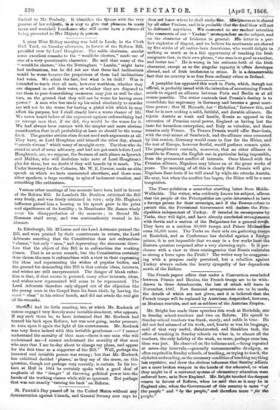• Sheffit i ld had its little meeting, too, at which Mr.
Roebuck of course engaged very fiercely some invisible slanderer, who appears, If any such there be, to have intimated that Mr. Roebuck had turned his back upon Reform, but was now going, under pressure, to turn upon it again the light of his countenance. Mr. Roebuck was very fierce indeed with this invisible gentleman :—" I cannot understand the morality of that man—there is one man who will understand me—I cannot understand the morality of that man who says that I am to-day about to change my phase, and appear for the first time as a supporter of the Bill." Well, perhaps the immoral and invisible person was wrong ; but that Mr. Roebuck has exhibited decided phases,' as they say of the moon, on this question, though not perhaps very recently, is certain. In his lec- ture at Hull in 1864 he certainly spoke with a good deal of emphasis of the " danger " of throwing political power into the bands of the working classes while still so ignorant. But perhaps that was not exactly turning his back' on. Reform.






























 Previous page
Previous page